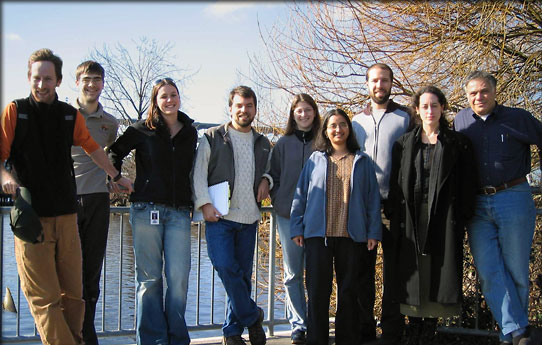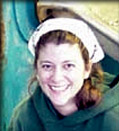Current and Past Members and Collaborators

Left to right: Joel Rice, Daniel Badger, Serra Morrison, Alexandre da Silva, Cindy Tribuzio, Muktha Menon, Ian Taylor, Nicci Vega, and Vince Gallucci.
Faculty Advisor

Vincent F. Gallucci
Professor, UW Aquatic & Fishery Sciences
vgallucc@u.washington.edu
http://fish.washington.edu/gallucci
Vince Gallucci is a faculty member in several different academic programs at the UW. He is a member of the School of Aquatic and Fishery Sciences, and an adjunct faculty member of the School of Marine Affairs, the Graduate Program in Quantitative Ecology and Resource Management (QERM), and the Jackson School of International Studies. These departments reflect his broad interests. Vince received a B.Sc. in physics from the SUNY at Stony Brook, a M.Sc. in biophysics from the SUNY at Buffalo, and a Ph.D. from N.C. State University in Statistics. He has almost two decades of active research as a marine biologist working on benthic ecosystems in North temperate and tropical systems. He worked for over a decade on marine resource management in developing countries from Central and South America to Africa. This work focused on small scale fisheries (artisanal fisheries) at the village level. Most of this latter work has involved the mathematics of quantitative stock assessment, i.e., the assessment of the current status of a stock of fish and the prediction, using mathematical models and statistics of their future status, if various levels of mortality are imposed as part of a harvest.
As part of the research efforts in tropical fisheries, he gained familiarity with tropical fisheries impacts upon shark and ray populations. This knowledge is now being applied in the study of local, coldwater sharks, as well as some tropical sharks. This is seen in the different projects that are being carried out by Gallucci and the graduate students working with him. In a very broad classification, the shark work can be partitioned into three different areas, the details of reproduction of the sharks, the development of mathematical models for the stock assessment and modeling of shark dynamics from growth of individuals to growth and migration of whole populations, and third, the use of technology for the determination of shark movements in terms of latitude and depth.
The graduate students who follow are all first-rate scientists, some many years from their undergraduate degrees, who have taken post-graduate courses, examinations and carried out extensive research projects. As a generalization, the research that is described by them is associated with their graduate, M.Sc. theses or Ph.D. dissertations.
Students

Joel Rice
Master's Program, QERM
joelrice@u.washington.edu
http://students.washington.edu/joelrice
Joel Rice is a Masters student in the University of Washington’s Quantitative Ecology and Resource Management program. His undergraduate degree is in mathematics from The Colorado College. Joel’s research focuses on the specifics of the growth and age distribution of spiny dogfish in the North East Pacific. Joel has worked on marine population dynamics of competing populations, in particular competition between Steller sea lions and salmon sharks. He is also studying the effects of regime change in marine ecosystems. Joel is funded by the North Pacific Research Board (NPRB).

Alexandre da Silva
PhD Program, SAFS
asilva@u.washington.edu
http://students.washington.edu/asilva
Alexandre Aires-da-Silva is a PhD candidate that joined the Gallucci lab in 2000 as a Fulbright student from Portugal. Before coming to SAFS-UW, he worked as a fisheries biologist at the Department of Oceanography and Fisheries, University of the Azores (Portugal), where he studied elasmobranch biology and fisheries (1994-2000). Alex’s dissertation work focuses on the study of the population dynamics of the blue shark in the North Atlantic. This topic represents a data-limited situation with respect to fisheries dependent (catch and effort) data. Tag-recapture observations of the National Marine Fisheries Service Cooperative Shark Tagging Program (NMFS-CSTP) and historical research cruise information are brought into the modeling process as auxiliary data. Alex is very interested on the use of Bayesian methods to estimate the uncertainty of model parameters. Coming from a strong background in fisheries biology, he believes that a sound knowledge of important aspects of the biology and ecology of a species should precede mathematical sophistication. This is critical if realistic mathematical models are desired. His interests also include the use of Geographical Information System (GIS) tools in fishery science and the management of artisanal fisheries in developing countries.

Ian Taylor
PhD Program, QERM
itaylor@u.washington.edu
http://students.washington.edu/itaylor
Ian G. Taylor is a Ph.D. student in University of Washington’s Quantitative Ecology and Resource Management program. His undergraduate degree is in mathematics and he taught math with the US Peace Corps in Zimbabwe prior to enrolling as a graduate student in 2000. Ian’s research has focused on the population dynamics of the spiny dogfish. He is developing a metapopulation model for spiny dogfish in the NE Pacific as part of an effort to assess the population in the region by integrating data on population structure, abundance, and movement patterns. His research interests also include the use of population indices based on reproductive value. Ian is funded by the Northwest Fisheries Science Center of NOAA Fisheries.

Nicci Vega
Master's Program, QERM
dryad@u.washington.edu
http://students.washington.edu/dryad
Nicci is a Masters student in the University of Washington’s Quantitative Ecology and Resource Management graduate program. She joined Vince Gallucci’s lab in 2003. Prior to arriving at the UW, Nicci obtained BS degrees in mathematics and biology at Worcester Polytechnic Institute. Nicci’s MS thesis focuses on latitudinal trends in the demography of the spiny dogfish in the eastern Pacific. This research incorporates theoretical mathematical aspects as well as field research and empirical analysis. Other research interests include bioenergetics and nutrient cycling.

Brian Langseth
Undergraduate Program, SAFS/Applied & Computational Mathematical Sciences
Brian is an undergraduate student double-majoring in Aquatic & Fishery Sciences and Applied & Computational Mathematical Sciences
Alumni

Cindy Tribuzio
Cindy is now a Ph.D. student at the University of Alaska, Juneau. She completed her M.Sc. with our group as a SAFS student. It was titled "An investigation of the reproductive physiology of two North Pacific shark species: spiny dogfish (Squalus acanthias) and salmon shark (Lamna ditropis)."

Muktha Menon
Muktha is now studying in India preparing to enter a Ph.D. program. She did her M.Sc. thesis in our group as a SAFS students. It was titled "Spatio-temporal modeling of pacific sleeper shark (Somniosis pacificus) and spiny dogfish (Squalus acanthias) bycatch in the Northeast Pacific Ocean."

Jason Gasper
Jason was a M.Sc. student in the School of Marine Affairs. His thesis was titled "The sportfishery in the Icy Strait/Glacier Bay/Cross Sound region of Southeastern Alaska: an analysis of charter guide-client power interactions and sportfishing catch, harvest, and effort."

Andy Herndon
Andy was a M.M.A. student in the School of Marine Affairs. His thesis was titled "The necessity of and rationale for an international commission to manage and conserve elasmobranches."

Serra Morrison
Serra was a M.M.A. student in the School of Marine Affairs. Her thesis was titled "A historical analysis of the spiny dogfish fishery of the Pacific Northwest, its co-management regimes, and lessons for future management."

Danny Badger
Danny was a SAFS undergraduate in our group first working as a general helper and then becoming as one of the graduate students. He is now a graduate student at the University of New Hampshire in the Large Pelagics Research Group. His senior Capstone Project was titled "Understanding large sharks in Puget Sound: contributions to the population dynamics of the sixgill shark."
© 2005 University of Washington. All rights reserved.
